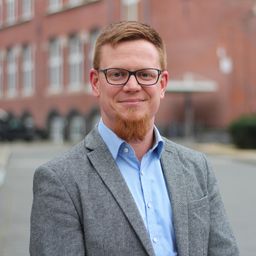
Daniel Kipp is currently employed as a teaching staff member and research associate at the THGA university and is mainly responsible for modules such as "special steels and their applications", "fatique and lifetime of machine elements" and "Practice Course: The Example Zollverein". As a PhD student at the TU Dortmund, he is working closely with the hcc.ruhr on research questions regarding non-destructive testing methods for time-efficient and data-based evaluation of transparent coating systems.
Before joining TH Georg Agricola university, Daniel Kipp had several positions in the industry such as technical marketing specialist at Deutsche Edelstahlwerke and Swiss Steel International in USA and in the quality assurance department at VDM Metals. Daniel Kipp studied "Applied Materials Science" at THGA university and in his Master's degree he expanded his know-how in Metallurgy and Metal Forming at university Duisburg Essen.
Sessions in which Daniel Kipp participates
segunda-feira 29 agosto, 2022
Within the scope of a research project, state of the art sensor-carrying drones using optical, thermal and multispectral imaging are used for the inventory of object of industrial heritage. Within the a first study the applicability of the sensors on corroded/coated surfaces and complex geometries (crevices) shall be elaborated. For this purpose, tests will be carried out on exhibits and samples under defined laboratory conditions and initial results will be compared. The further approach,...
Sessions in which Daniel Kipp attends
segunda-feira 29 agosto, 2022
This session is about the “hard facts” of conservation. It aims to draw together technical knowledge from related fields. Industrial conservation specialists rely on specialised knowledge and may sometimes not be aware that there is expertise and proven good or best practice in related fields. The transferring of knowledge from related engineering, construction preservation and architectural conservation specialists can serve the purpose of promoting and securing future preservation of ...
This session is about the “hard facts” of conservation. It aims to draw together technical knowledge from related fields. Industrial conservation specialists rely on specialised knowledge and may sometimes not be aware that there is expertise and proven good or best practice in related fields. The transferring of knowledge from related engineering, construction preservation and architectural conservation specialists can serve the purpose of promoting and securing future preservation of ...
This session is about the “hard facts” of conservation. It aims to draw together technical knowledge from related fields. Industrial conservation specialists rely on specialised knowledge and may sometimes not be aware that there is expertise and proven good or best practice in related fields. The transferring of knowledge from related engineering, construction preservation and architectural conservation specialists can serve the purpose of promoting and securing future preservation of ...
In a traditional Quebec sugar shack atmosphere, enjoy a maple taffy rolled on snow in the purest tradition, accompanied by music of the occasion!
terça-feira 30 agosto, 2022
Industrialization processes have been global from their very beginning. However, their interpretation still tends to be limited to specific locations or regions, and to specific time periods. Regularly, for example, it is stated that the industrial revolution started in Europe, from where it spread to the world, supposedly bringing technological and social progress to „less developed“ countries. Earlier periods of technology and knowledge transfer processes, that were already in place in t...
During the Industrial Revolution coal was the most important energy source for both homes and industries. At the time, coal mining created strong regional industrial identities and mentalities, as well as industrial images and imaginaries in the eyes and minds of external observers. Such identities and ideas of coal would go on to shape industrial landscapes and communities.The papers presented in this session investigate the s...
During the Industrial Revolution coal was the most important energy source for both homes and industries. At the time, coal mining created strong regional industrial identities and mentalities, as well as industrial images and imaginaries in the eyes and minds of external observers. Such identities and ideas of coal would go on to shape industrial landscapes and communities.The papers presented in this session investigate the s...
Past efforts to conserve and interpret industrial heritage have rarely acknowledged the role of industry causing damaging environmental change. But todays obvious worldwide climate change inevitably impacts our thinking about conservation. This is why we propose a Roundtable session to encourage people to take a fresh look at environmental impacts of industrial heritage.Already in the 1970s narratives of industrial history as a succession of triumphs began to be qu...
sexta-feira 2 setembro, 2022
Walkers will meet at the entrance (there is only one) of Lionel Groulx Metro and from there walk along the canal to the St-Gabriel Locks. This was once the most heavily industrialized area in Canada. It is now a zone of affluence between the hardscrabble, but now gentrifying, Point Saint-Charles, historically Irish and French, and Little Burgundy, one of Montreal's first multi-racial neighbourhoods. Several former factories were converted into condominiums in the...
Come and share the good times of the congress and celebrate your scientific and professional discoveries in a former fruit jam factory, Usine C, built in 1913 and transformed at the end of the 1970s into a place for creation and dissemination.Discover Montreal's gastronomy thanks to an exceptional caterer. Learn about Montreal's musical heritage and the history of the industrial district that brought it to life. Then hear and experience Quebec's musical tradition as you are carried ...
